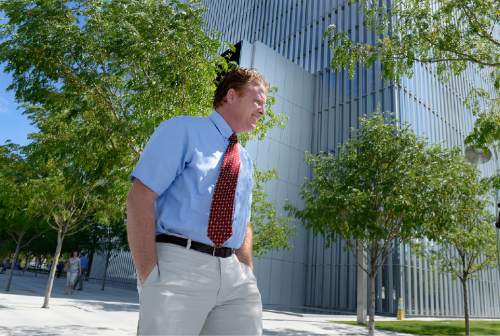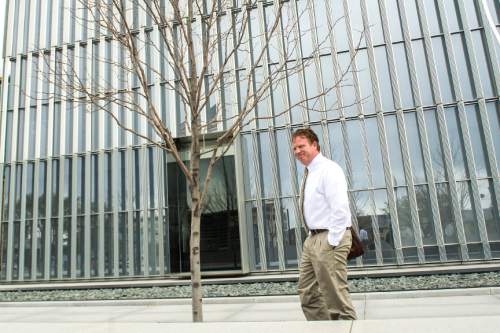This is an archived article that was published on sltrib.com in 2015, and information in the article may be outdated. It is provided only for personal research purposes and may not be reprinted.
A federal judge declined Wednesday to delay the February trial of Jeremy Johnson — even though about two years' worth of emails involving the St. George businessmen, three other defendants and several witnesses are missing from evidence.
And, in another move that could roil the proceedings, Johnson filed a new request asking the court to allow him to represent himself at the trial on 86 charges related to alleged bank fraud.
At the beginning of the hearing, U.S. District Judge David Nuffer held up a large white envelope, which he said Johnson had mailed to the court. Nuffer said it contained copies of emails to Johnson's attorneys — answering questions about evidence in the case — a binder titled "Where are the emails?" and motions asking to be allowed to act as his own attorney.
Johnson's current attorney, Rebecca Skordas, asked the judge not to review the contents of the envelope because it contained private attorney-client communications.
"I also think it contains information that's harmful to his case," Skordas said.
Nuffer said he passed the Johnson motions to act as his own attorney on to U.S. Magistrate Judge Paul Warner, who has been presiding over most matters leading up to the trial. Warner later came to the courtroom and set a hearing for next week to consider Johnson's motions.
It was the third time Johnson has requested to act as his own lawyer and, Warner said, "we need to resolve this once and for all."
Johnson's motion was not made part of the record. But, in a filing in a parallel lawsuit brought by the Federal Trade Commission in Nevada, Johnson said that he had learned from evidence that his attorneys in the criminal case, Rebecca Skordas and her husband, Greg Skordas, had represented a government witness against him named Justin Lund.
The Skordases told him that the conflict had been disclosed to Warner and the prosecution before the Skordases were appointed to the case, says the FTC filing.
"According to Mr. Johnson's new counsel, it was decided that Mr. Johnson would not be told about the potential conflict of interest before he was appointed new counsel," Johnson says in the filing, which asks the court to release some of his seized I Works funds so he can hire his own attorneys.
New evidence shows that Lund, as a main client and marketer of I Works' products, may have been the cause of some of company's problems over which it was sued by the FTC, the filing says.
Participants in the criminal case are under a gag order that bars them from discussing specific issues.
The charges involving Johnson and the three other top employees of I Works revolve around whether they tried to defraud Wells Fargo bank by setting up what the government terms "shell companies" to continue processing credit and debit cards after I Works was placed on a watch list because of a large number of chargebacks.
Johnson has said that the banks or their agents knew who was behind the companies, had advised I Works how to set them up and had not lost any money because of the arrangements.
Rebecca Skordas, joined by attorneys Marcus Mumford and Steven Killpack, had asked Nuffer to delay the trial because new files from I Works' computers were just becoming available and they wanted time to evaluate whether there might be evidence favorable to their clients.
At the beginning of the Wednesday hearing, Rebecca Skordas said Johnson had directed his attorneys to withdraw their motion asking to delay the trial set to begin Feb. 1 with jury selection. Skordas didn't offer an explanation, and the hearing went ahead as scheduled because two of the defendants had joined in the motion.
Testimony from Eric Wheeler, the defense's electronic data expert, and FBI computer forensic specialist Randy Kim showed that Kim uncovered a huge cache of files on an I Works server in early November. The server is being held by a court-appointed receiver in the FTC lawsuit in Nevada, and copies of it previously provided to prosecutors and defense attorneys had not contained the missing data, Wheeler and Kim told Nuffer.
Nuffer declined to delay the trial, saying the defendants could hire additional help to review the new files if needed, and that they had not shown that any of new information could be valuable to them.
Left up in the air was an explanation as to why there is a huge chunk of emails missing from the evidence in the criminal and civil cases.
Johnson has shown in receiver filings in the Nevada case — set for trial in January — that time sheets filed by the receiver indicate its computer expert "extracted" the emails from an I Works computer server but says they were never provided to the defendants in either case.
Prosecutors are now trying to get possession of the server from the receiver in order to "clone" it and search for the missing emails.





